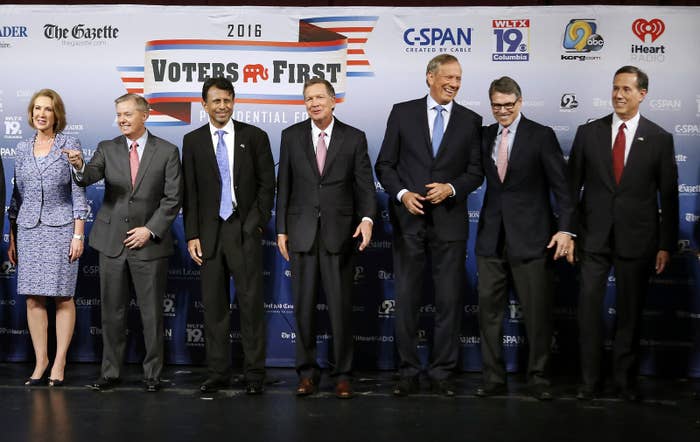
WASHINGTON — Hours before the first official Republican debate begins on Thursday in Cleveland, the several other candidates who didn't make the big debate will take the stage hoping to rescue their slim poll numbers.
These candidates are not preparing, according to their campaigns. They are prepared.
"She plays solitaire on her phone when we have downtime," said Sarah Isgur Flores, the spokesperson for Carly Fiorina. "Does that count?"
The Bobby Jindal campaign likewise responded with a certain level of disdain for its fellow undercard debaters.
"Unlike other candidates, Bobby has a tremendous bandwidth for information and policy," said Jindal spokesperson Shannon Dirman. "He's smart, has the backbone to do the right thing, and his experience has prepared him well for debates on any number of policy topics. If anyone thinks they can beat him in a debate I'd love to learn about it."
Most of the discussion of Thursday's debate has revolved around how the top-tier candidates will respond to bomb-throwing Republican frontrunner Donald Trump; Rand Paul, for example, is reportedly practicing with a Trump stand-in. But while everyone's paying attention to this, there's a parallel universe where the candidates who didn't poll high enough to make the cut for the main debate are doing their own expectations-setting and trash-talking.
As for Rick Santorum, who pulled off a surprisingly successful shoestring campaign in 2012 but who has struggled to break into the conversation this time, his campaign says he's not bothering with any special debate prep at all.
"Sen. Santorum's debate prep remains the same as it has always been," said Santorum campaign communications director Matt Beynon. "He does town hall meetings in the days leading up to debates. No question he will get in a debate is tougher than one he will receive from an Iowa or New Hampshire voter."
Beynon said Santorum has never done debate prep in the past either, beyond town hall meetings.
Other campaigns were more circumspect. Lindsey Graham's campaign, for example, declined to share details of their debate preparation process.
The debate for the low-polling candidates is scheduled to take place at 5 p.m. on Thursday in Cleveland, four hours before the 9 p.m. debate featuring the top 10 candidates. It will last one hour, as opposed to the prime-time debate's 90 minutes, and will be moderated by Fox News' Bill Hemmer and Martha MacCallum.
Some of the undercard candidates have criticized the structure of the debates as giving an unfair advantage to candidates who are doing better in polling at a point in the election cycle when polling numbers don't mean much. Santorum called the poll numbers "irrelevant" on ABC's This Week on Sunday, pointing out that he was polling poorly at this point in 2012 but went on to win Iowa as well as 11 other states.
The Fiorina campaign sent around a memo on Monday downplaying the debate, saying, “We know that what polls say in July or August does not predict what voters will say in 2016. We have built an operation that can go the distance and win. Our strategy does not depend on any one single event to propel our candidate forward.”
Graham was more blunt, saying on MSNBC that the qualifications for getting into the debate "suck" and that he's being left out for "no good reason."
But the lower-tier candidates are actually getting a better deal now than they were before. Originally, their debate was scheduled for 1 p.m., when fewer people are tuning into Fox. And for candidates who have little name ID and limited fundraising ability, it constitutes an important free media opportunity. The RNC has defended the two-debate arrangement as "the most inclusive setup in history."
And the 5 p.m. debaters don't have to deal with the wildcard that is Trump, a subject that the higher-polling campaigns are obsessing over.
"Imagine a NASCAR driver mentally preparing for a race knowing one of the drivers will be drunk. That's what prepping for this debate is like," John Weaver, an adviser to Ohio Gov. John Kasich, tweeted last week.
